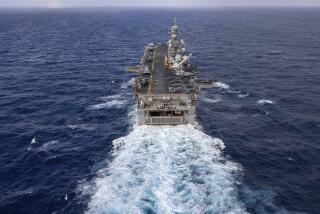U.S. to mount drone-zapping laser on Navy ship [VIDEO]
- Share via
The Navy plans to install a laser gun on a ship next year to zap dangerous swarming small boats and flying drones while in the Persian Gulf.
Officials say the $32-million high-technology system offers the Navy a weapon a fraction of the cost of its traditional arsenal -- cruise missiles, as well as rapid-fire Gatling guns.
PHOTOS: U.S. Navy’s Laser Weapon System
“Our conservative data tells us a shot of directed energy costs under $1,” Chief of Naval Research Rear Adm. Matthew Klunder said in a statement. “Compare that to the hundreds of thousands of dollars it costs to fire a missile, and you can begin to see the merits of this capability.”
The laser’s power also can be scaled down, presenting the Navy a non-lethal alternative to ward off threats such as pirates, terrorists and smugglers.
“Because lasers run on electricity, they can be fired as long as there is power and provide a measure of safety as they don’t require carrying propellants and explosives aboard ships,” the Navy said.
The technology, called the Laser Weapon System, was developed by engineers and scientists from the Navy, defense industry and academia. It involves commercial fiber solid state lasers and has already successfully shot down a flying target (see the video above).
It will be deployed on board USS Ponce in 2014.
The announcement to utilize the laser comes as military researchers continue to try to make progress on directed energy weapons.
In 2011, the Navy had success with another laser system mounted on a warship when it fired and set fire to an empty motorboat as it bobbed in the Pacific Ocean. It was the first time in history the Navy pulled off the feat.
In what was once considered the stuff of science fiction, the development of laser technology has been fraught with setbacks.
Last year, the Missile Defense Agency’s airborne laser program was canceled after more than 15 years of development and $5 billion in federal funding.
The program involved a Boeing 747 jumbo jet equipped with an advanced tracking system and a massive laser gun on its nose to identify and obliterate enemy missiles as they blast off. But the program experienced a series of cost overruns and delays. It never went beyond testing.
The Navy’s desired targets with the Laser Weapon System are far smaller and slower.
Following next year’s USS Ponce demonstration -- which comes two years ahead of schedule -- Navy and Pentagon officials said they will continue to research ways to integrate affordable laser weapons into the fleet.
ALSO:
Boeing completes FAA certification testing for 787 batteries
Drone maker AeroVironment sputters as defense spending dries up
NASA sends fleet of small drones to inspect noxious volcano plumes
More to Read
Inside the business of entertainment
The Wide Shot brings you news, analysis and insights on everything from streaming wars to production — and what it all means for the future.
You may occasionally receive promotional content from the Los Angeles Times.











